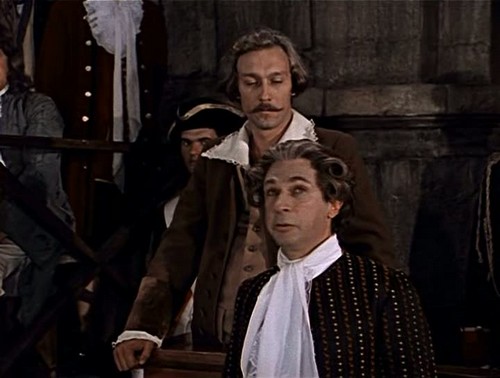The more I watch it, the more I regard Tot samyy Myunkhgauzen as one of the greatest films of all time.
[Warning:Â You might want to watch it before reading any more of this.]
Tonight I’ve been re-watching this scene in which the Burgomeister (Igor Kvasha) tries to avoid testifying that his friend, Karl (Baron Münchausen) is really not Baron Münchausen but the gardener Müller.   You could say it’s a matter of career vs friendship, and of one kind of friendship vs another, for the Burgomeister.   And it probably is not just a casual friendship, because the Burgomeister is the only person who shows no surprise at seeing Münchausen come back from the dead. He’s not the only one who knew he wasn’t really dead, but he’s the only one who takes his reappearance calmly, which implies that they had been in touch.
For Münchausen the issue is a matter of life and death, but that’s minor compared to the larger issue at stake. For him, the worst outcome is for his friends and family to lie to save his life.  It’s not quite that simple, though, which is one of the things that makes this movie good. It takes a while to catch all the nuances.
Kvasha is superb here in acting out the the conflict this makes for him.  It’s good for a laugh, but it’s a deadly serious comic situation. (At the end, when the issue of life and death cannot be put off, Münchausen tells us our problem is we take things too seriously.  Which does not mean it’s no longer a life and death situation.)
Almost everything about the film is perfect.   The only part I wish would have been done a little differently is this scene involving Münchausen’s ex-wife (superbly played by Inna Churikova) and the woman who loves him (also well played by Yelena Koreneva).  I wish the filmmakers had not used this dramatic, high-contrast lighting to make her look sinister, because it just isn’t necessary to make the point about what is going on.  Thus far in the film she has done everything without that gimmick. Among other things, she shows her contempt for all the men in her life who don’t live up to her ex’s standards. Which means all of the men — including lovers, her son, and those she is using to get her ex out of the way.
So this lighting looks a little out of place with the rest of the film, though only slightly out of place.  It’s just a wild guess, but I wonder if this scene was filmed early in the process, perhaps before the filmmaker (Mark Zacharov) finalized his approach to the whole project.
In the same scene Münchausen’s ex says that yes, Marta should tell the truth, but what kind of truth would she tell? Marta, who has had a difficult time with the Baron’s peculiar obsession with truth, replies, “правда одно”.
I’ve been thinking about the version in these English subtitles, “Truth is unique.”  That’s not a wrong translation, but I wonder if it might not convey the important point, given the various connotations of the word “unique.”  I guess I would have found a more literal translation like “Truth is one” to have had more impact if all I had to go by was the subtitles.  But perhaps “truth is unique” is better than a wordier “there is one truth,” which sounds too preachy and off-topic for the situation.   The tone of voice in which it is said perhaps conveys the meaning regardless of the translation.
I wish I could understand everything else without the subtitles.
This is a film for which Russian subtitles are available, so next I’m going to do is watch it with those.  Maybe I’ll learn a few things.
Speaking of translations, it’s interesting the various ways in which the title of the film gets translated into English:
- That very Munchausen
- The very same Munchausen
- Munchausen
- The One and Only Munchausen
- The Real Munchausen
The latter two were versions I found in news items that appeared in U.S. newspapers after Grigory Gorin, the writer of the script and of an earlier stage version of the story, died in June 2000.
[Morning-after edits made, 8 May 2011]


